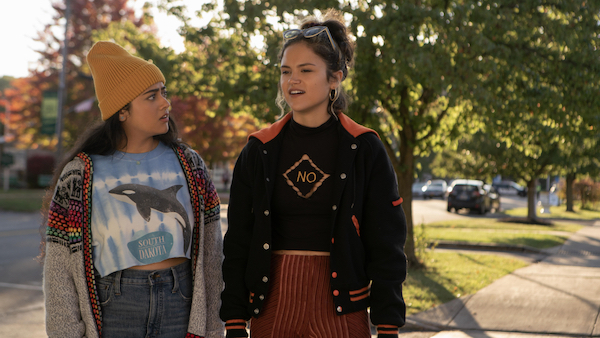Film Review: “Plan B” — A Walk on the Wild and Diverse Side
By Sarah Osman
Plan B, Hulu’s latest raunchy teen romp, proves why we need diverse voices in Hollywood.
Plan B, directed by Natalie Morales. Streaming on Hulu.

Victoria Moroles and Kuhoo Verma in Plan B. Photo: Hulu
Every few years, a “smart” teen comedy comes along that is so quotable and memorable it quickly becomes a staple in pop culture. There’s Ferris Bueller’s Day Off, Clueless, Mean Girls, Superbad … etc. In addition to their quick wit, these films have another common element: they star and focus on white people. Few teen films have revolved around characters who are BIPOC, and most of these have been written for a white audience. Plan B, Hulu’s latest raunchy teen romp, breaks that trend — and proves why we need diverse voices in Hollywood.
Directed by actress Natalie Morales and written by Joshua Levy and Prathiksha Srinivasan, Plan B concentrates on the fumbling adventures of two best friends: Sunny (Kuhoo Verma), a straight-A student trying to come to terms with her sexuality in spite of her perfectionist mom, and Lupe (Victoria Moroles), a rebel whose father berates her for everything she does, from the grades she gets to the lipstick she uses. No matter how hard they try, the pair don’t fit in with their fellow students at a small high school in the farmlands of South Dakota. Their school’s sexual education, which is conveyed via car metaphors, advises students to stay in abstinent gear. Unfortunately, abstinence-only education, which persists at many high schools across the country, has been shown to lead to unnecessary mistakes and contribute to confusion about one’s sexuality. And that is exactly what happens to the girls.
When Sunny’s mother goes out of town on a business trip, Lupe convinces her friend to throw a party so that they can invite their crushes, Hunter (Michael Provost) and Logan. Sadly for Sunny, Hunter leaves the party with one of the bitchiest girls in school. Left in a drunken, heartbroken state, Sunny decides to sleep with born-again Christian/magician, Kyle (Mason Cook). When Sunny realizes that she hadn’t been as safe as she thought she had been, she and Lupe set out to locate a Plan B pill.
The pair head over to the local pharmacy, where Sunny fears the pharmacist, who is part of the “Indian Mafia.” For those of you who did not grow up with parents who are immigrants, the “mafia” is a network of people who are of the same ethnic group as you and your parents — and if you live in a small community, you’d best believe that everyone knows everyone else’s business. This small running gag is not only hilarious, but also touches on an issue that few white American teens deal with. Children of immigrants (like myself) are often put under far more pressure than their white peers. If they don’t live up to their parents’ expectations — or they somehow embarrass them — they bring “shame” upon the family.
Lupe decides to say that the Plan B pill is for her, but the pharmacist won’t sell to her because a) she is underage, and b) his “moral conscience.” This law is frustrating, but healthcare workers have the right to refuse to perform certain procedures if it goes against their religious or ethical beliefs. Because there is only one pharmacy in town, Sunny and Lupe are forced to take Sunny’s mother’s car (without her knowing) and drive three hours to the local Planned Parenthood. This is the premise that launches Sunny and Lupe’s wild road trip, but it also highlights a serious issue — even today, women still have little to no control or say over their body. With the passage of heartbeat laws in certain states, as well as the lack of funding for services like Planned Parenthood, many women often have to drive hours to receive the services they need, or end up not being able to access help at all. If Plan B was set in Los Angeles or Chicago (as many teen movies are), this plot line would be nonsense. But this teen movie takes place in America’s heartland, where, when it comes to a woman’s body, not all is equal.
During their trip, Sunny and Lupe get lost and end up smoking weed with an overly friendly gas station attendant (Edi Patterson). They escape from a dangerous drug dealer and end up at a bowling alley so that Lupe can see her crush’s band play. Luckily for Sunny, Hunter happens to be at the show for the same reason. As the two girls flirt with their respective crushes we see them come to terms with their sexuality, especially Lupe’s desire for Logan (who is not a boy).
The girls’ hijinks continue, leading to a few laugh-out-loud scenes in which we see Sunny on speed. Plan B concludes on a sweet note. Both of our heroines reveal to their parents who they really are — and are met with open, loving arms. Plan B may not be as quote-friendly as Mean Girls or Clueless, but it puts across a message that hasn’t been on screen. Growing up in conservative America as a teenage girl who is also a BIPOC is a challenge that, at least this time around, is a laughing matter.
Sarah Mina Osman is a writer living in Los Angeles. She has written for Young Hollywood and High Voltage Magazine. She will be featured in the upcoming anthology Fury: Women’s Lived Experiences under the Trump Era.
